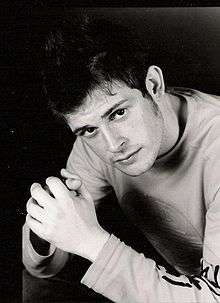мужчина
Russian

Мужчи́на
Etymology
Attested since the 16th century as мущи́на (muščína); the word is still pronounced in a way that is directly rendered by this outdated spelling, but the current spelling more explicitly displays the etymology and the even older Slavic sound structure. From Old East Slavic *мѫжьщина (*mǫžĭščina), from Proto-Slavic *mǫžьščina, from *mǫžьskъ + *-ina, from *mǫžь + *-ьskъ. Equivalent to мужско́й (mužskój) + -ина (-ina).
Pronunciation
- IPA(key): [mʊˈɕːinə]
Audio (file)
Noun
мужчи́на • (mužčína) m anim (genitive мужчи́ны, nominative plural мужчи́ны, genitive plural мужчи́н)
Declension
Declension of мужчи́на (anim fem-form hard-stem accent-a)
| singular | plural | |
|---|---|---|
| nominative | мужчи́на mužčína |
мужчи́ны mužčíny |
| genitive | мужчи́ны mužčíny |
мужчи́н mužčín |
| dative | мужчи́не mužčíne |
мужчи́нам mužčínam |
| accusative | мужчи́ну mužčínu |
мужчи́н mužčín |
| instrumental | мужчи́ной, мужчи́ною mužčínoj, mužčínoju |
мужчи́нами mužčínami |
| prepositional | мужчи́не mužčíne |
мужчи́нах mužčínax |
Pre-reform declension of мужчи́на (anim fem-form hard-stem accent-a)
| singular | plural | |
|---|---|---|
| nominative | мужчи́на mužčína |
мужчи́ны mužčíny |
| genitive | мужчи́ны mužčíny |
мужчи́нъ mužčín |
| dative | мужчи́нѣ mužčíně |
мужчи́намъ mužčínam |
| accusative | мужчи́ну mužčínu |
мужчи́нъ mužčín |
| instrumental | мужчи́ной, мужчи́ною mužčínoj, mužčínoju |
мужчи́нами mužčínami |
| prepositional | мужчи́нѣ mužčíně |
мужчи́нахъ mužčínax |
References
- Trubačev O. N., editor (1994), “*mǫžьščina”, in Etimologičeskij slovarʹ slavjanskix jazykov [Etymological dictionary of Slavic languages] (in Russian), volume 20, Moscow: Nauka, page 166
- Vasmer, Max (1964–1973), “мущина”, in Etimologičeskij slovarʹ russkovo jazyka [Etymological Dictionary of the Russian Language] (in Russian), translated from German and supplemented by Trubačóv O. N., Moscow: Progress
This article is issued from
Wiktionary.
The text is licensed under Creative
Commons - Attribution - Sharealike.
Additional terms may apply for the media files.